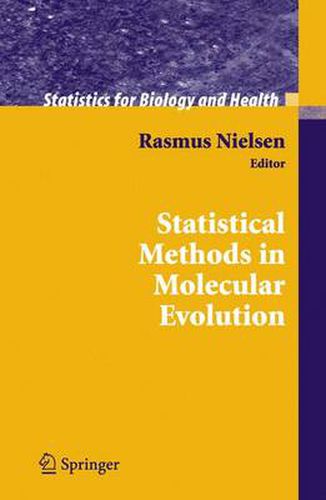Readings Newsletter
Become a Readings Member to make your shopping experience even easier.
Sign in or sign up for free!
You’re not far away from qualifying for FREE standard shipping within Australia
You’ve qualified for FREE standard shipping within Australia
The cart is loading…






This title is printed to order. This book may have been self-published. If so, we cannot guarantee the quality of the content. In the main most books will have gone through the editing process however some may not. We therefore suggest that you be aware of this before ordering this book. If in doubt check either the author or publisher’s details as we are unable to accept any returns unless they are faulty. Please contact us if you have any questions.
In the field of molecular evolution, inferences about past evolutionary events are made using molecular data from currently living species. With the availability of genomic data from multiple related species, molecular evolution has become one of the most active and fastest growing fields of study in genomics and bioinformatics.Most studies in molecular evolution rely heavily on statistical procedures based on stochastic process modelling and advanced computational methods including high-dimensional numerical optimization and Markov Chain Monte Carlo. This book provides an overview of the statistical theory and methods used in studies of molecular evolution. It includes an introductory section suitable for readers that are new to the field, a section discussing practical methods for data analysis, and more specialized sections discussing specific models and addressing statistical issues relating to estimation and model choice. The chapters are written by the leaders of field and they will take the reader from basic introductory material to the state-of-the-art statistical methods. This book is suitable for statisticians seeking to learn more about applications in molecular evolution and molecular evolutionary biologists with an interest in learning more about the theory behind the statistical methods applied in the field. The chapters of the book assume no advanced mathematical skills beyond basic calculus, although familiarity with basic probability theory will help the reader. Most relevant statistical concepts are introduced in the book in the context of their application in molecular evolution, and the book should be accessible for most biology graduate students with an interest in quantitative methods and theory.Rasmus Nielsen received his Ph.D. form the University of California at Berkeley in 1998 and after a postdoc at Harvard University, he assumed a faculty position in Statistical Genomics at Cornell University. He is currently an Ole Romer Fellow at the University of Copenhagen and holds a Sloan Research Fellowship. His is an associate editor of the Journal of Molecular Evolution and has published more than fifty original papers in peer-reviewed journals on the topic of this book.
$9.00 standard shipping within Australia
FREE standard shipping within Australia for orders over $100.00
Express & International shipping calculated at checkout
This title is printed to order. This book may have been self-published. If so, we cannot guarantee the quality of the content. In the main most books will have gone through the editing process however some may not. We therefore suggest that you be aware of this before ordering this book. If in doubt check either the author or publisher’s details as we are unable to accept any returns unless they are faulty. Please contact us if you have any questions.
In the field of molecular evolution, inferences about past evolutionary events are made using molecular data from currently living species. With the availability of genomic data from multiple related species, molecular evolution has become one of the most active and fastest growing fields of study in genomics and bioinformatics.Most studies in molecular evolution rely heavily on statistical procedures based on stochastic process modelling and advanced computational methods including high-dimensional numerical optimization and Markov Chain Monte Carlo. This book provides an overview of the statistical theory and methods used in studies of molecular evolution. It includes an introductory section suitable for readers that are new to the field, a section discussing practical methods for data analysis, and more specialized sections discussing specific models and addressing statistical issues relating to estimation and model choice. The chapters are written by the leaders of field and they will take the reader from basic introductory material to the state-of-the-art statistical methods. This book is suitable for statisticians seeking to learn more about applications in molecular evolution and molecular evolutionary biologists with an interest in learning more about the theory behind the statistical methods applied in the field. The chapters of the book assume no advanced mathematical skills beyond basic calculus, although familiarity with basic probability theory will help the reader. Most relevant statistical concepts are introduced in the book in the context of their application in molecular evolution, and the book should be accessible for most biology graduate students with an interest in quantitative methods and theory.Rasmus Nielsen received his Ph.D. form the University of California at Berkeley in 1998 and after a postdoc at Harvard University, he assumed a faculty position in Statistical Genomics at Cornell University. He is currently an Ole Romer Fellow at the University of Copenhagen and holds a Sloan Research Fellowship. His is an associate editor of the Journal of Molecular Evolution and has published more than fifty original papers in peer-reviewed journals on the topic of this book.